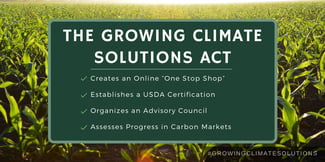
The recent reintroduction of the Growing Climate Solutions Act, authored by Senators Stabenow (D-MI) and Braun (R-IN), will create clarity for farmers seeking to tap into new carbon market incentives for climate-smart agriculture. The Senate Agriculture Committee is expected to take up the bill soon.
The Growing Climate Solutions Act offers meaningful progress toward enabling farmer and landowner participation in voluntary carbon markets. Agriculture companies like BASF and Bayer have committed to carbon reductions by 2030 within the industry, but everyone is asking HOW. How are we going to achieve these targets - especially at the individual farm level.
 “Addressing the climate crisis is one of the most urgent challenges we face and our farmers and foresters are an important part of the solution,” said Senator Stabenow,(left) Chairwoman of the U.S. Senate Committee on Agriculture, Nutrition, and Forestry. “The bipartisan Growing Climate Solutions Act is a win-win for farmers, our economy and for our environment. Our bill is a perfect example of how we can work across the aisle and find common ground to address a critical issue affecting all of us and our future.”
“Addressing the climate crisis is one of the most urgent challenges we face and our farmers and foresters are an important part of the solution,” said Senator Stabenow,(left) Chairwoman of the U.S. Senate Committee on Agriculture, Nutrition, and Forestry. “The bipartisan Growing Climate Solutions Act is a win-win for farmers, our economy and for our environment. Our bill is a perfect example of how we can work across the aisle and find common ground to address a critical issue affecting all of us and our future.”
Regenerative farming practices such as no-till farming, conservation-tillage, and the use of cover crops are made possible through the use of pesticides. The responsible use of pesticides within these systems helps protect the environment and improves the sustainability of our food supply. Through the use of pesticides and other crop protection technologies, farmers can produce more food using fewer resources, while conserving water, reducing soil erosion, and reducing greenhouse gas emissions.
Sustainability in farming practices is a very hot topic especially now as we enter one of the busiest seasons for farmers.
“The bipartisan Growing Climate Solutions Act recognizes farmers, agribusinesses, and rural communities as key allies in the fight against climate change. Our agriculture sector brings the cutting-edge technology and entrepreneurial spirit needed to help tackle this historic challenge. We appreciate Senator Debbie Stabenow and Senator Mike Braun for leading a bipartisan proposal to reward agricultural innovation, amplify climate solutions that start on America’s farms, and spark new market opportunities for agriculture,” said Chuck Lippstreu, President of the Michigan Agri-Business Association.
The Growing Climate Solutions Act creates a certification program at USDA to help solve technical entry barriers that prevent farmer and forest landowner participation in carbon credit markets. These issues – including access to reliable information about markets and access to qualified technical assistance providers and credit protocol verifiers – have limited both landowner participation and the adoption of practices that help reduce the costs of developing carbon credits.
To address this, bill establishes a Greenhouse Gas Technical Assistance Provider and Third-Party Verifier Certification Program through which USDA will be able to provide transparency, legitimacy, and informal endorsement of third-party verifiers and technical service providers that help private landowners generate carbon credits through a variety of agriculture and forestry-related practices. The USDA certification program will ensure that these assistance providers have agriculture and forestry expertise, which is lacking in the current marketplace. As part of the program, USDA will administer a new website, which will serve as a “one-stop-shop” of information and resources for producers and foresters who are interested in participating in carbon markets.
Through the program, USDA will help connect landowners to private sector actors who can assist the landowners in implementing the protocols and monetizing the climate value of their sustainable practices. Third-party entities, certified under the program, will be able to claim the status of a “USDA Certified” technical assistance provider or verifier. The USDA certification lowers barriers to entry in the credit markets by reducing confusion and improving information for farmers looking to implement practices that capture carbon, reduce emissions, improve soil health, and make operations more sustainable.
Today, many third-party groups are developing protocols and testing methods to calculate emissions reduction and sequestration in agriculture and forestry. The landscape is evolving rapidly. The Growing Climate Solutions Act recognizes this fact and provides the Secretary with a robust advisory council composed of agriculture experts, scientists, producers, and others. The advisory council shall advise the Secretary and ensure that the certification program remains relevant, credible, and responsive to the needs of farmers, forest landowners, and carbon market participants alike.
Finally, the bill instructs USDA to produce a report to Congress to advise about the further development of this policy area including: barriers to market entry, challenges raised by farmers and forest landowners, market performance, and suggestions on where USDA can make a positive contribution to the further adoption of voluntary carbon sequestration practices in agriculture and forestry.













